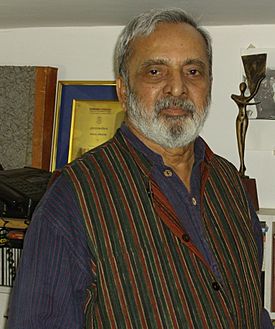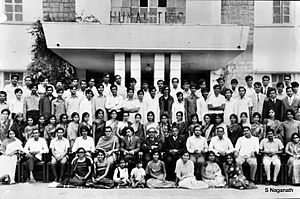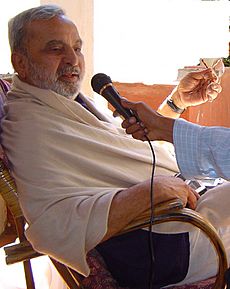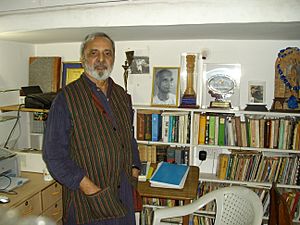U. R. Ananthamurthy facts for kids
Quick facts for kids
U. R. Ananthamurthy
|
|
|---|---|
 |
|
| Born | 21 December 1932 Melige, Thirthahalli, Shivamogga, Kingdom of Mysore, British India |
| Died | 22 August 2014 (aged 81) Bangalore, Karnataka, India |
| Occupation | English Professor, Vice Chancellor, President Sahitya Akademi and National Book Trust |
| Nationality | Indian |
| Alma mater | Mysore University, University of Birmingham |
| Period | 1950-2014 |
| Genre | Story, Novel, Poetry and Criticism |
| Subject | Various Themes |
| Literary movement | Navya |
Udupi Rajagopalacharya Ananthamurthy (born December 21, 1932 – died August 22, 2014) was a famous Indian writer and critic. He wrote in the Kannada language. He was born in a place called Melige in Thirthahalli. He is known as one of the key figures of the Navya movement, which was a new style of writing.
In 1994, he received the Jnanpith Award. This is the highest award for writers in India. He was the sixth Kannada writer to get this honor. Later, in 1998, the Government of India gave him the Padma Bhushan award. This is another very high civilian award. He also served as the head of Mahatma Gandhi University in Kerala for some years. In 2013, he was even considered for the Man Booker International Prize. He was a strong critic of certain political ideas until he passed away in 2014.
Contents
Early Life and Education
U. R. Ananthamurthy was born into a Kannada-speaking family in Melige. This village is in the Shimoga District. He started his schooling in a traditional Sanskrit school. He then continued his studies in Tirthahalli and Mysore.
After earning his Master of Arts degree from the University of Mysore, he taught English there. He then went to England for more studies. He received a special scholarship called the Commonwealth Scholarship. In 1966, he earned his doctorate from the University of Birmingham. His research focused on how politics and stories were connected in the 1930s.
His Career Journey
Ananthamurthy began his career as a professor in 1970 at the University of Mysore. He later became the Vice-Chancellor of Mahatma Gandhi University in Kottayam, Kerala, from 1987 to 1991.
He also led important organizations. In 1992, he was the Chairman of the National Book Trust of India. In 1993, he was chosen as the president of the Sahitya Academy. This is India's national academy of letters.
Ananthamurthy was also a visiting professor at many universities. These included Jawaharlal Nehru University in India and universities in Germany and the United States. He also served as the Chairman of the Film and Television Institute of India twice. In 2012, he became the first Chancellor of the Central University of Karnataka. He also helped start the Humanities department at Manipal University.
He traveled a lot, giving talks and attending seminars as a writer. He visited countries like the Soviet Union, France, and Germany. He also led a group of writers who visited China in 1993.
His Literary Works
Many of Ananthamurthy's books have been translated into different Indian and European languages. His most famous works include Samskara, Bhava, Bharathipura, and Avasthe. He also wrote many short stories. Several of his novels and short stories were even turned into movies.
Ananthamurthy's writings often explored the inner thoughts and feelings of people. He looked at how people reacted to different situations and changes in society. For example, he wrote about the challenges faced by traditional families in Karnataka. He also wrote about how politics could affect government workers.
His novels often showed how individuals reacted to unusual or difficult situations. He explored how social, political, and economic changes affected traditional Hindu societies in India. He showed the conflicts that could arise, like between a father and son, or a husband and wife. But he also showed the deep love that existed despite these clashes. You can see this in his stories like Sooryana Kudure (The Grasshopper) and Ghatashraddha.
For instance, in Sooryana Kudure, the main character, Venkata, is not very successful in life. His family is disappointed in him. But Venkata is a simple person who doesn't let life's troubles get him down. He finds joy in small things, like a grasshopper shining in the sun. Even after a big argument with his son, he can still be amazed by such a tiny sight.
Many of his novels became popular films. These include Samskara, Bara, Avaste, and Ghatashraddha.
Personal Life
U. R. Ananthamurthy married his wife, Esther, in 1956. They had two children, Sharath and Anuradha. He lived in Bangalore for most of his later life. His son-in-law, Vivek Shanbhag, is also a well-known writer in Kannada.
Political Involvement
Ananthamurthy also took part in politics. In 2004, he ran for the Lok Sabha, which is a part of India's Parliament. He said his main reason for running was to oppose the Bharatiya Janata Party (BJP).
A leader from the Janata Dal (Secular) party, H. D. Deve Gowda, had asked him to run for their party. Ananthamurthy also ran for the Rajya Sabha elections in 2006.
He also had an important idea to rename ten cities in Karnataka. He wanted to change their names from old colonial names to their original native names. The Government of Karnataka accepted his idea. The cities were renamed during the celebration of Karnataka's golden jubilee.
Awards and Honors
- 1984: Rajyothsava Award
- 1994: Jnanpith Award
- 1998: Padma Bhushan
- 2004: Sahitya Akademi Fellowship
- 2008: Nadoja Award by Kannada University
- 2011: Shortlisted for The Hindu Literary Prize (for Bharathipura)
- 2012: D. Litt. Honoris Causa from the University of Calcutta
- 2012: Basheer Puraskaram
- 2013: Nominated for the Man Booker International Prize
Film Awards
Ananthamurthy also won several awards for his stories and dialogues in films:
- 1970-71: Best Story Writer for Samskara
- 1977-78: Best Story Writer for Ghatashraddha
- 1987-88: Best Dialogue Writer for Avasthe (shared with Krishna Masadi)
- 2002-03: Best Story Writer for Mouni
His Passing
U. R. Ananthamurthy passed away on August 22, 2014, in Bangalore, India. He was 81 years old. He had been ill with kidney problems for several years and was receiving treatment. He was admitted to the hospital with an infection and fever before his death.
The Prime Minister of India, Narendra Modi, shared his sadness and condolences after Ananthamurthy's death.
 | Mary Eliza Mahoney |
 | Susie King Taylor |
 | Ida Gray |
 | Eliza Ann Grier |




